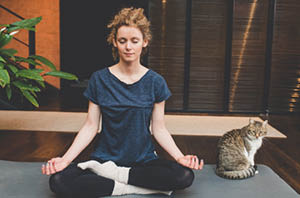Why Self-Care Isn’t Selfish
Are you eating, drinking, and sleeping enough?
In order to feel safe, your basic needs must be met. Abraham Maslow developed a theory called “Maslow’s Hierarchy of Needs” in 1943 which identifies physical needs, safety needs, love and belonging, esteem, and self-actualization as essential human needs.
You don’t have to go overboard with self-pampering in order to take care of yourself. Sometimes simple steps are all it takes to give yourself some love.
How to start…
Benefits of Self-Care
You’re not alone.
Rates of depression have tripled in recent years. You may find yourself or a loved one struggling with their mental health.
Engaging in self-care has been clinically proven to reduce or eliminate anxiety and depression, according to an article by Mental Health First Aid.
It can also help reduce stress, increase happiness, build strong relationships, and develop resilience.
More Than one Type of Self-Care
Physical Self-care
You need to take care of your body in order for it to run efficiently. The body-mind connection is strong, and they work together well. When the physical body is strong, mental health is positively affected as well.
Physical health includes how you are fueling your body, how much exercise you provide your body, and how well you are taking care of your physical needs.
Physical activities release endorphins, which give your body extra energy and feel-good vibes. Endorphins also positively affect your psychological health.
The following questions will help you assess how to improve your physical health:
- Am I getting adequate sleep?
- Is my diet fueling my body?
- Am I taking control of my health?
- Am I getting sufficient exercise?
Mental Self-Care
The types of thoughts you think and the things you fill your mind with have an immense influence on your psychological well-being.
Activities you can do to keep your mind sharp are learning new things, solving puzzles, and reading books.
Staying mentally healthy also includes practicing self-compassion and self-acceptance. Be kind and forgiving to yourself. Your self-talk can really bring you down, so change it. Start by noticing your thought patterns. Don’t allow yourself to go down a negative path. Once you notice the thoughts, you immediately take away their power. You can focus your awareness on something that brings you joy.
Ask yourself these questions about your mental health:
a) Am I making time for activities that mentally engage me?
b) Am I aware of my mental self-talk?
Social Self-care
Make it a priority to spend time with people you love and those who love you.
Sometimes when we are feeling low, we tend to isolate ourselves. What we need instead is companionship.
Schedule time with people who are important to you; when you nurture relationships, they become sustainable and comforting in the long term.
Ask yourself:
a) When was the last time I invited a loved one over for coffee, tea, or a glass of wine?
b) What types of activities would I love to do with a friend or family member? What is stopping me from making a plan?
Spiritual Self-Care
Nurturing your spirit can involve religion, but doesn’t have to. Spiritual care can be anything that makes you feel a deeper sense of meaning and connection to the universe.
Whether you enjoy church services, meditation, time in nature, or praying, spiritual self-care is important.
Essential Questions of Spirituality:
- Am I engaging in spiritual practices that fulfill me?
- What questions can I ask myself about my life and experiences?
Emotional Self-Care
It is imperative to have healthy coping skills when dealing with difficult emotions, such as anger, shame, anxiety, and grief. Emotional self-care includes activities that help you safely express and regulate your feelings.
Having a confidante to confide in and share thoughts and feelings with is important. If you have been through a traumatic event in your life, it can be healing to participate in individual therapy.
Setting boundaries also helps with self-care because you are recognizing what you need and asking for it. Setting boundaries can help manage stress, and create a healthy relationship with yourself as well as healthy relationships with others. Sometimes we need to learn how to say no to what doesn’t serve us and focus on our own priorities.
Consider these questions about emotional health:
- Do I have healthy ways to process my emotions?
- Do I prioritize activities in my life that make me feel energized?
Finally, remember how important these three tips are to your entire well-being. They will positively affect your physical, emotional, and mental health.
Spend time outdoors • Eat a healthy, balanced diet • Make sleep a priority
Put Yourself First: For a Healthier, Happier You.
Here are some ideas on how to get started with routines, but remember to first think about what brings you joy, what makes your soul sing. What inspires one person may not sound fun at all to you. Our differences are what makes us interesting!
Brainstorm ways to incorporate these activities into your daily life. Set goals, ask for help to create a support system, tweak your routine as you go, and Voila! You have started a self-care routine.
Morning Routine
Start small and incorporate a simple morning routine. Choose one or two from the list and begin today.
- Read something that inspires you.
- Journal about what you just read, how your day went the day before, or even about what you dreamt about the night before.
- Stretch, walk, or do a mini yoga session.
- Listen to an inspirational audiobook or podcast.
- Sip your morning coffee or tea, and simply enjoy it.
- Make a playlist of happy morning music to get you motivated.
Bedtime Routine
Do a self check-in and ask yourself what makes you feel good. Does a warm cup of tea sound comforting? A glass of red wine? Do you feel like reading? Or zoning out with Netflix? A hot bath?
Whatever sounds good, start your routine an hour (or two) before bedtime.
Good sleep is one of the best things you can do for self-care. It will do you no good to push back your bedtime in order to take self-care measures.
If you are a worrier, try keeping a “worry list” by your bed. If there is something bothering you, write it down and let it go. You can address everything on your list the following day, or later that week.
Top 10 Self-Care Practices to Incorporate into Your Daily Routine
- Spend time outside
- Take a nap
- Turn off your phone
- Share a hug
- Spend time with your pet
- Practice positive thinking
- Get moving
- Meditate
- Spend time with friends
- Make a gratitude list
Incorporating a self-care routine will reduce stress and anxiety, increase energy and self-love, and have a positive effect on others in your life.
Start now.
Take baby steps, but start today.
If you would like additional support, contact a mental health specialist or family practitioner to help you address your physical and mental health needs.








